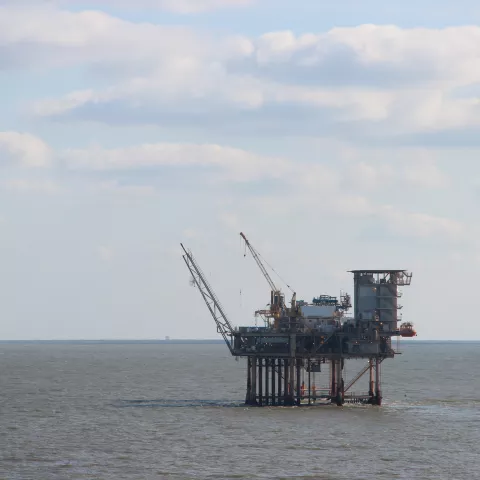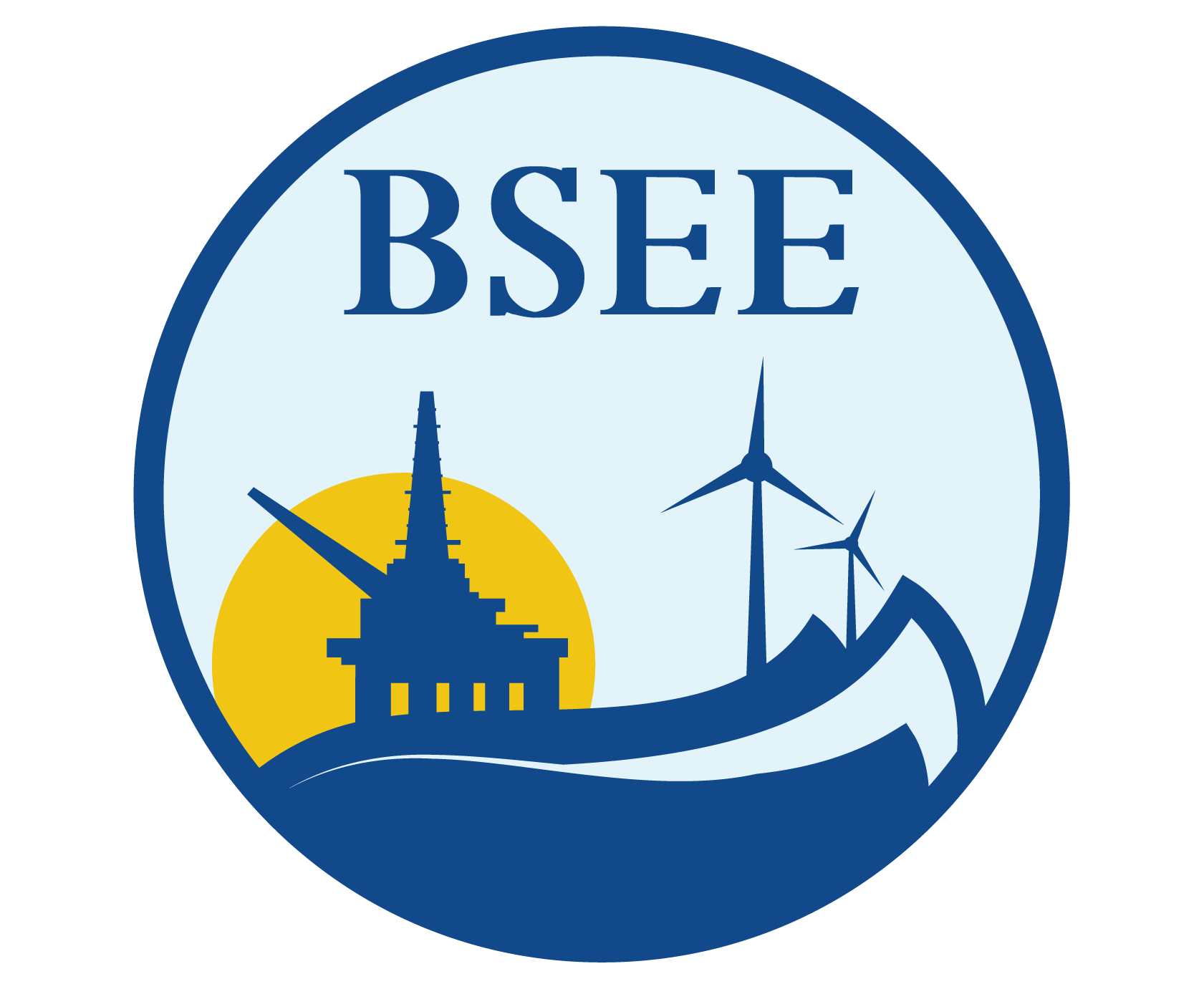
You are viewing ARCHIVED content published online before Jan. 20, 2025. Please note that this content is NOT UPDATED,
and links may not work. Additionally, any previously issued diversity, equity, inclusion or gender-related guidance on
this webpage should be considered rescinded. For current information, visit
News Items | Bureau of Safety and Environmental Enforcement.
HOUMA, LA – New research released today from the Bureau of Safety and Environmental Enforcement (BSEE) and Bureau of Ocean Energy Management (BOEM) indicates the need to define the Gulf of Mexico Shallow Water Province (water depth less than 200 meters) as a distinct province to avoid stranding more than $20 billion of the Nation’s oil and natural gas resources.
The Shallow Water Province is a historically energy-rich area that now primarily serves as a natural gas province, accounting for 33 percent of the Gulf’s natural gas production and just over 10 percent of its oil production. Production and infrastructure investment used to be substantially higher in the Shallow Water Province, but over the last 20 years, development has moved onshore or to deepwater operations. The number of wells drilled has decreased 89 percent over the last 10 years, and approximately 100 platforms a year are being removed with no new platforms being installed. If this trend continues, the lack of development will potentially strand 179 million barrels of oil and 4,567 billion cubic feet of natural gas that have an estimated worth of $20 billion.
The joint research report, “Gulf of Mexico Data and Analysis/ Leasing, Drilling and Production, Gulf of Mexico Shallow Water Potential Stranded Assets,” which supports President Trump’s Executive Orders 13795, 13868 and 13783 of promoting offshore energy infrastructure, independence and economic growth, evaluates the contributing factors for this decline and recommends using an updated discount rate for the two distinct provinces.
“This research provides critical information that energy development in the Gulf of Mexico should not be managed with a ‘one size fits all’ approach in how we avoid stranding our nation’s valuable energy resources,” said BSEE Director Scott Angelle. “Although reversing the natural decline may not be entirely possible, promoting the recovery of the remaining oil and natural gas resources in the Gulf of Mexico Shallow Water Province, while protecting the interests of the American public, is an obligation this administration is taking action on.”
“Once the infrastructure is removed, we will not be able to recover these resources,” Angelle continued. “The nation is essentially on a ‘shot clock’ to make sure that does not happen.”
“BOEM estimates that $20 billion in oil and natural gas resources could be stranded in the Gulf of Mexico Shallow Water Province if the current trends continue,” said BOEM Acting Director Walter Cruickshank. “To ensure maximum resource recovery, BSEE and BOEM are working together to encourage increased activity consistent with the resource conservation policy established by Congress under Outer Continental Shelf Lands Act.”
The research has laid the groundwork for two actions that encourage increased activity in the province. They include: (1) BOEM’s publication of updated discount rates for the two distinct provinces of the Gulf of Mexico; namely, the Shallow Water Province and the Deepwater Province (the discount rate for the Deepwater Province also applies to all other OCS areas that that will be used for BSEE’s special case royalty relief evaluations); and (2) verification that BSEE has authority to consider applications for royalty relief on a “per project” basis. These projects can include exploratory wells in order to promote development of discovered resources.
The updated discounted rate for the Shallow Water Province will apply to special case royalty relief applications and will only be applicable for new wells and production in the region.
“High royalty rates prevent as much as $20 billion in shallow water energy projects,” said Louisiana Senator Bill Cassidy, M.D. “Lowering this barrier encourages production which increases revenue for taxpayers and the number of jobs for Louisiana workers.”
"Drilling in the shallow waters of the Gulf of Mexico has plummeted to the point that $20 billion in oil and gas could be abandoned,” said Louisiana Senator John Kennedy. “This hurts workers across the state, from Houma to Cameron. The research released today will help us develop an attack plan that will increase interest in the shallow waters and protect jobs.”
“Today’s announcement is proof of BSEE’s commitment to the taxpayer and conservation,” said Chairman of the Western Caucus, Congressman Paul Gosar (AZ-04). “With an estimated $20 billion in stranded oil and gas off our coast, it is essential that we have the infrastructure in place to ensure every drop of recoverable energy is extracted. Every barrel of oil produced from existing offshore operations is one less barrel we need to import from foreign nations.”
Additionally, the report concludes that when investment increases activity in the province, there are ancillary benefits for the province, region, and country. According to BOEM, for every million-dollar investment in shallow water, the total economic impact, including the reinvestment of state and local taxes, yields approximately $1.7 to $2 million in additional economic activity.
“During the last federal administration, Louisiana lost one out of every three jobs in the energy industry — having substantial impacts on Louisiana families,” said Congressman Garret Graves (LA). “We are continuing to see an extraordinary reduction in shallow water energy infrastructure and development. The Department of the Interior actions today will help to promote Louisiana energy for America, cleaner natural gas exports and increased funding for coastal restoration and flood protection.”
“I’m glad to see President Trump continuing to promote policies which incentivize the development of our abundant oil and gas resources,” said Congressman Ralph Abraham (LA).
“By taking advantage of the stranded resources in the shallow waters of the Gulf, we will create jobs, grow the economy, and continue to build our energy independence. This is good news for Louisiana and for the nation.”
“My office has pushed for royalty relief on the federal level since coming to Congress. Lowering or waiving rates would deliver a big win for offshore energy production in the Gulf of Mexico and restore oil and gas jobs to Louisiana,” said Congressman Clay Higgins (LA). “This report is further evidence that President Trump and his administration are doing everything possible at the federal level to promote American energy dominance. Louisiana’s state government should follow that example.”
“I applaud the Trump Administration for looking for creative ways to expand energy production in the Gulf of Mexico,” said Congressman Bradley Byrne (AL). “The funds Alabama receives are extremely important to the Gulf Coast and our entire state, and I am glad to have the support of the Trump Administration on this important matter."
“Our membership, made up of anglers who rely on a healthy marine environment, fully support efforts to preserve and maintain habitat provided by oil and gas infrastructure,” said Executive Director of the Coastal Conservation Association of Louisiana David Cresson. “Marine reefs provide some of the world’s most critical habitat, yet we find ourselves in a position where we are losing much of this habitat due to the rapid removal of platforms. We believe efforts to maintain this habitat in a responsible way would be beneficial to many marine species, and the coastal communities who depend on them.”
“Finally, an administration in Washington, D.C., that gets it and has worked to be part of the solution rather than continuing to be an obstacle,” said Director of Business Development for Crosby Tugs, LLC, Cory H. Kief. “We could have used this leadership a decade ago, but I am excited that we have it today. As an industry, we are eager to be included in extending the life of shallow water infrastructure and ensuring energy security for America. For us, the work needs to start now!”
“Terrebonne Port is situated in the center of the marine fabrication/repair industry directly supporting the oil & gas operations in the US Gulf of Mexico. Our mission statement centers around creating an economic environment that generates long term employment,” said Executive Director of the Terrebonne Port Commission David Rabalais. “This new federal research on Gulf of Mexico shallow water oil and gas operations validates what we have known for years. The energy industry plays a critical role in the economic stability of this region, and the effects of the effort to sustain oil and gas operations in the shallow water long enough to fully realize the benefits of the remaining resources will have a long-term economic impact in Terrebonne and the surrounding region.”
“IAGC members play a critical role in identifying and enabling access and development of shallow water resources,” said President of International Association of Geophysical Contractors Nikki Martin. “We appreciate the Administration’s efforts to encourage increased activity under OCSLA in the shallow waters and look forward to seeing reciprocal efforts to remove unnecessary, excessive and unwarranted restrictions on exploration and development activity that currently exist in these very areas in the impending Gulf of Mexico regulatory frameworks.
Background
Since 1947, 47,765 wells have been drilled in Gulf of Mexico Shallow Water Province, but over the past 10 years (2008-2018), the number of wells drilled in the province have decreased 89 percent. The number of platforms installed have also followed similar trend lines as 6,991 platforms have been installed since 1947, while 5,102 platforms have been removed. Production in the Shallow Water Province has moved almost entirely to natural gas, but both oil and natural gas production is down from historic highs. Since 1998, oil production has decreased 77 percent, and natural gas production has decreased 92 percent.
Revenues from oil and gas production in the Gulf of Mexico go, in part, back to the coastal states that support these operations. The Department of the Interior disbursed $214.9 million in FY 2018 energy revenues to the four Gulf oil and natural gas producing states – Alabama, Louisiana, Mississippi and Texas – and their coastal political subdivisions. This was an increase of $26.95 million or 14.3 percent in comparison to FY 2017. The disbursements paid to the states support coastal conservation and restoration projects, hurricane protection programs, and activities to implement marine, coastal, or conservation management plans.
# # #
The Bureau of Safety and Environmental Enforcement (BSEE) is the lead federal agency charged with improving safety and ensuring environmental protection related to the offshore energy industry, primarily oil and natural gas, on the U.S. Outer Continental Shelf (OCS). Under President Trump, BSEE is conducting more inspections, increasing the number of safety and environmental initiatives and ensuring more offshore oil and natural gas workers receive critical safety information.
BOEM’s mission is to manage development of U.S. OCS energy and mineral resources in an environmentally and economically responsible way.
